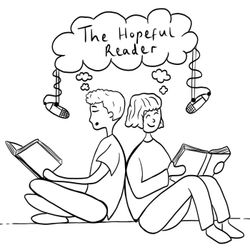Latest episode

3. It's a feral critter summer: queer entanglements and response-able mindfulness
49:58||Season 2, Ep. 3In today’s episode the hopeful readers are on tour - well, at our local park - such that the two of us have become multiple in connection with nature (there’s some birdsong in the background lol). Whilst neoliberal capitalism has co-opted mindfulness in lieu of systemic change, we explore how the work of queer theorists and ecofeminists might enable us to re-orientate our approach to mindfulness, enabling us to realise our response-ability to the (natural, wild and feral) world that constitutes our very becoming.
More episodes
View all episodes

2. Fangirling so hard rn: queering obsession & “parasocial relationships”
35:37||Season 2, Ep. 2Is fandom culture a way to politically and ethically refuse normative attachments - a way to opt out of the mainstream? In this episode we neuroqueer the idea of ‘obsession’ and discuss what ‘parasocial’ relationships even are at a time in which algorithms are always already dis/organising social life. Inspired by the Japanese novel Idol, Burning by Rin Usami and a recent Black Mirror episode, this one (predictably) gets a bit existential…
1. We are so back: szn 2, let's go!
20:22||Season 2, Ep. 1We are so back: szn 2, let's go! If you've been wondering what we've been up to, and what we've got planned for this season - this episode reveals all! We also talk about how the philosophical tradition of speculative pragmatism guides our hopeful thinking and reading. :)
13. Cosy counterproductivity: a silly little episode
44:23||Ep. 13In a society that ascribes inherent value to productivity, it’s easy to overlook the potentially harmful structures we are actually (re)producing through our labour. In this episode we explore the cult of productivity - life under capitalism - through a neuroqueer lens. We question how the individualistic nature of self-discipline that surrounds productivity interacts with acts of solidarity and mutual aid, and how we might build futures that are more welcoming of queer community building. You can also look forward to some hot takes on mindfulness and slow living, as well as some very un/serious yapping towards the end of the episode…References:Choi, M.A. (2021). The power of slowness: Governmentalities of Olle walking in South Korea. Transactions of the IBG. 47 (2). Pp. 562-576.Cook, E. (2016). (Dis)Connections and silence: experiences of family and part-time work in Japan. Japanese Studies. DOI:10.1080/10371397.2016.1215228Gregg, M. (2018) Counterproductive: Time management in the knowledge economy. London: Duke University Press.Kafer, A. (2013). Feminist, Queer, Crip. Indiana: Indiana University Press.Lorde, A. (1988) A burst of light. New York: Firebrand books.Manning, E. (2016). The Minor Gesture. London: Duke University Press.
12. Poetry is cool!
28:03||Ep. 12
11. Hear me out: Joker 2...
28:38||Ep. 11Leaning into our film bro personas, in this episode we use the latest Joker movie to explore how dissociation - the cultivation of numbness, or splitting of subjectivity - might be considered a subtle form of resistance whilst inhabiting hostile environments. Is our refusal to be affected by oppressive structures a revolutionary act of self-preservation? Or does cultivated numbness prevent us from mobilising towards radical change? Ultimately…why is everyone hating on the new Joker film? References: Aitken, S. in Anderson et al. (2022) Encountering Berlant part one: Concepts otherwise. https://doi.org/10.1111/geoj.12494Awkward-Rich, C. (2022). The Terrible We: Thinking with trans maladjustment. Durham: Duke University Press. Berlant, L. (2022). The Inconvenience of Other People. Durham: Duke University Press. Bissell, D. (2021). The Anaesthetic Politics of Being Unaffected: Embodying Insecure Digital Platform Labour. The Anaesthetic Politics of Being Unaffected: Embodying Insecure Digital Platform Labour - Bissell - 2022 - Antipode - Wiley Online LibraryMalatino, H. (2022). Side Affects: On being trans and feeling bad. Minnesota: University of Minnesota Press. Turner, C. (2024). The transgender space invader: Out of time and out of affect. European Journal of Cultural Studies.
10. Becoming beautiful, online
39:33||Ep. 10In the age of the algorithm, social media platforms and machine learning technologies are now defining, and perpetually updating, aesthetic ideals and beauty standards. In this episode, we discuss how beauty culture is entangled with the digital technologies that have become so pervasive in everyday life. How does ‘algorithmic oppression’ play into the creation and maintenance of beauty standards, and how does it feel to exist as cyborg, changeling bodies within all of this? Inspired by various works of fiction and drawing upon critical theory, we explore how we might hack and resist the affordances of these technologies through embodying and embracing glitches, and in ways that gesture towards queer and non-binary becoming. Atlanta, E. (2024) Pixel Flesh: How toxic beauty culture harms women. London: Headline Publishing Group. Awad, M. (2023) Rouge. New York: Scribner Publishing. Noble, S. U. (2018). Algorithms of Oppression: How Search Engines Reinforce Racism. New York: New York University Press Russell, L. (2020) Glitch Feminism: A Manifesto. London: Verso Books. Sender, K. & Shaw, A. (2017) Queer Technologies: Affordances, Affect, Ambivalence. London: RoutledgeTa-Wei, C. (1995 [2021]) The Membranes: a novel. Columbia: Columbia University Press. Zuboff, S. (2019) The Age of Surveillance Capitalism: The fight for a human future at the new frontier of power. London: Profile Books Ltd. Zwick, D. & Knott, J. D. (2009) “Manufacturing Customers: The database as new means of production.” Journal of Consumer Culture, 9(2).